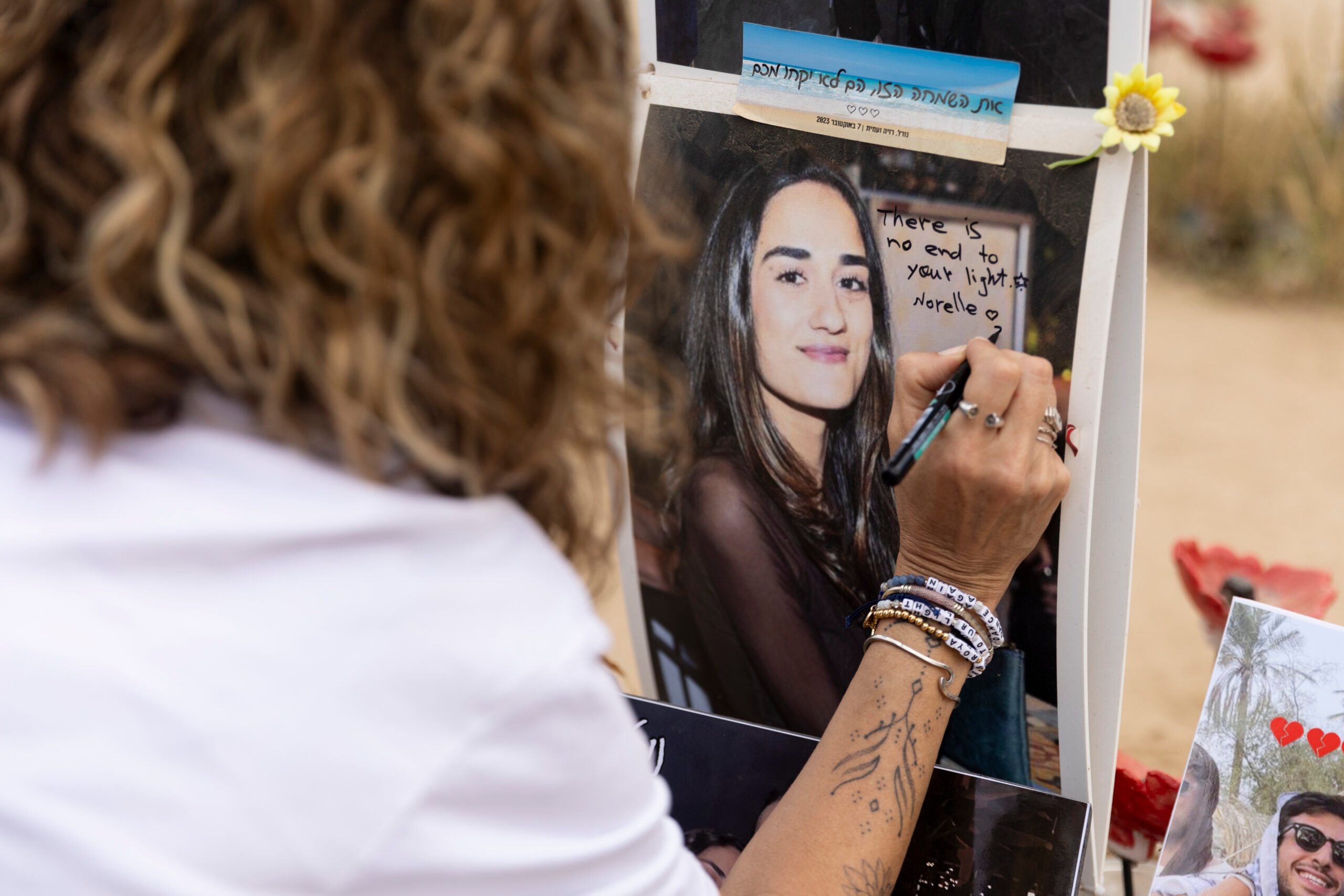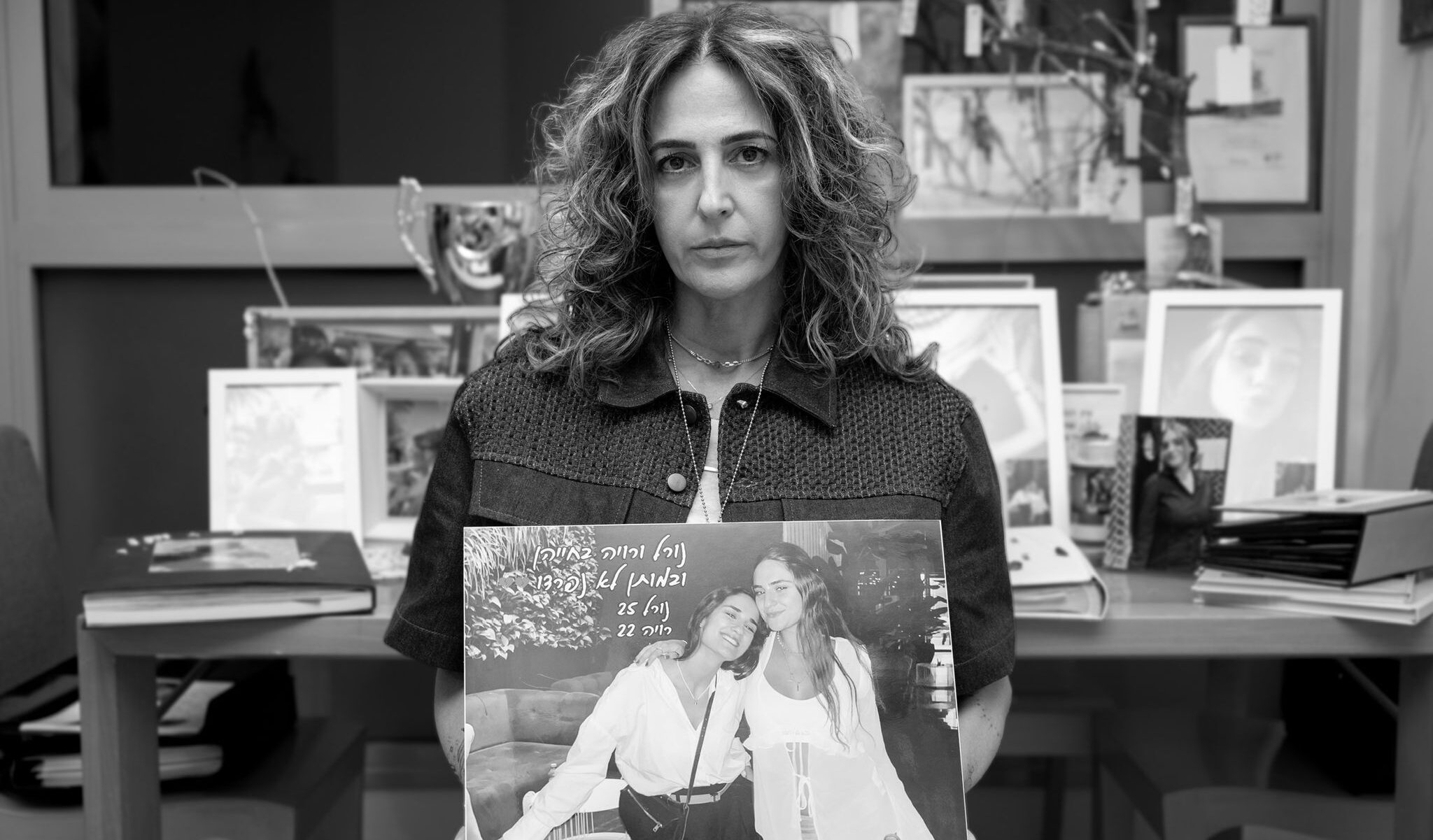TEL AVIV — Unlike most of the victims’ families, Sigal Manzuri chose not to be in Israel on Oct. 7. Instead, she accepted an invitation to deliver a speech at the United Nations building in New York, marking the unveiling of a photography exhibition that commemorates the stories of 25 victims, including her two daughters, Norelle Manzuri, 25, and Roya Manzuri, 22, dual American-Israeli citizens who were murdered by Hamas terrorists at the Nova music festival.
The decision wasn’t easy, but Sigal said she felt that honoring Norelle and Roya’s memory and spreading a message of unity — among all peoples — outweighed everything else.
“The biggest thing that scares me is that time is passing. It’s a year later and suddenly it’s old news,” she said. “I’m very, very scared that this whole tragedy will dissolve into thin air, and suddenly I’ll wake up and they won’t be spoken about any more.”
Sigal always speaks of the victims as a trio: her two daughters and Norelle’s boyfriend Amit Cohen, who had planned to propose on Norelle’s birthday. The three were inseparable and the only small comfort Sigal has, she said, is the belief that they are still together.
In addition to Oct. 7, Sigal, her husband Manny and son Shai will commemorate Oct. 9, 12 and 15, the dates of the trio’s funerals. Sigal was sitting shiva for Roya and fearing that Norelle had been taken captive when she joined a Zoom call with President Joe Biden and the families of other American hostages. During the call, a knock on the door brought the news that Norelle had also been killed.
“I told Joe Biden that for us it was too late,” Sigal recalled, adding that Biden buried his face in his hands and wept. (Rachel Goldberg-Polin, whose son Hersh was abducted from the Nova festival and murdered in captivity, recounted the incident later that month.)
Since that day, the Manzuri family’s entire raison d’etre is their murdered loved ones. “Everything I do revolves around Oct. 7,” she said.
Sigal and Manny Manzuri visit the marker of their daughters Norelle and Roya, who were killed on Oct. 7 at the Nova music festival in Re’im, Israel, on April 7, 2024, the sixth-month anniversary of the Hamas attack. (Amir Levy/Getty Images)
Both Sigal and Manny left their jobs as an interior designer and contractor, respectively, and their remaining son, Shai, 15, dropped out of high school. For Sigal, their mission — carried out from their home base in the central Israel city of Hod Hasharon — goes beyond memory preservation.
“We are devoting our own lives to continuing the lives of our daughters and Amit,” she said.
The endeavor has taken her to different cities to share their story, with a demanding and ever-changing schedule, though she said she strives to maintain some sense of routine for Shai. She described her son as a source of strength, always ensuring she eats, rests, and slows down when needed, but expressed sadness that he keeps his own pain hidden. A recent stop to be part of the Nova Exhibition in Los Angeles was particularly fraught, she said, because it was home for many years. The family immigrated to Israel in 2010, when the girls were fourth and sixth graders at Temple Israel of Hollywood’s Jewish day school.
Sigal’s voice lifts when she speaks of her daughters. Both were creative — Norelle in fashion and Roya in jewelry design and film — and they shared a dream of blending their artistic talents with psychology as a form of therapy. From a young age, Norelle was her “best friend,” Sivan said, and an anchor for everyone around her. A natural performer who loved acting, singing and dancing, Roya was “like a fairy, with a kind of magic that touched everyone.”
“I’ve always felt very lucky that they chose me as their mother, that they came into the world through me,” she said.
Like other grieving families, Sigal finds milestones like birthdays — which in Norelle’s case would have coincided with Amit’s proposal — especially painful. “
To mark these days without them is cruel. It requires a lot of strength but on the other hand, you can’t just let them pass you by.” Even routine events, like Friday night dinners, are hard. “There were six of us around the table. Suddenly we’re half a family, because half of us were murdered.”

Sigal Manzuri writes on the marker of her daughter Norelle who was killed at the Nova music festival on Oct. 7. (Amir Levy/Getty Images)
She described the pain as something that can strike so intensely it feels like it’s breaking her. When alone, she allows herself to break down, but around others, hides her emotions. “It’s not just emotional pain, it’s physical, and it can come without warning.”
Though she tries to shield herself from the constant news of the war, the mounting death toll has still pierced her personal grief. “I’ve realized the heart can break over and over — and still keep holding it all,” she said.
While she seeks justice for those responsible, she makes a clear distinction between justice and revenge, saying she feels no anger and asks no questions — neither of the country’s leadership nor of God.
“This is bigger than any of us. The only thing I ask for is guidance on how to stay faithful to my heart and not get lost.”
Motherhood defines her, she said, and even as she cares for Shai, she will extend that role to her friends’ children and nephews. Alongside preserving her daughters’ legacy, that is what will keep her moving forward, she said.
“If there’s anything I’m proud of in this life, it’s my children. Nothing else in my life was ever as meaningful as them. The realization that now I’m a grieving mother is crushing.”
Support the Jewish Telegraphic Agency
Help ensure Jewish news remains accessible to all. Your donation to the Jewish Telegraphic Agency powers the trusted journalism that has connected Jewish communities worldwide for more than 100 years. With your help, (JEWISH REVIEW) can continue to deliver vital news and insights. Donate today.




